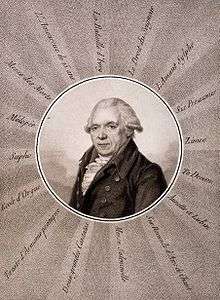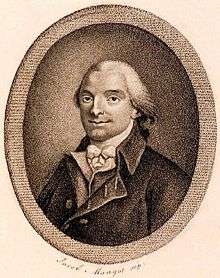Plaisir d'amour
"Plaisir d'amour" (literally "Pleasure of love") is a classical French love song written in 1784 by Jean-Paul-Égide Martini (1741–1816); it took its text from a poem by Jean-Pierre Claris de Florian (1755–1794), which appears in his novel Célestine.
 Music by Jean-Paul-Égide Martini (1741–1816) |
 Lyrics by Jean-Pierre Claris de Florian (1755–1794) |
The song was greatly successful in Martini's version. For example, a young woman, Madame Julie Charles, sang it to the poet Alphonse de Lamartine during his cure at Aix-les-Bains in 1816, and the poet was to recall it 30 years later.[1]
Hector Berlioz arranged it for orchestra (H134) in 1859.[2] Louis van Waefelghem arranged the tune for viola d'amore or viola and piano in the 1880s. It has been arranged and performed in various pop music settings.
Lyrics
Original poem by de Florian
Plaisir d'amour ne dure qu'un moment, |
The pleasure of love lasts only a moment, |
Popular lyrics
Plaisir d'amour ne dure qu'un moment.
chagrin d'amour dure toute la vie.
The joys of love are but a moment long
The pain of love endures the whole life long
Your eyes kissed mine, I saw the love in them shine
You brought me heaven right then when your eyes kissed mine.
My love loves me, and all thy wonders I see
The rainbow shines in my window, my love loves me
And now he's gone like a dream that fades into dawn
But the words stay locked in my heartstrings, my love loves me
Plaisir d'amour ne dure qu'un moment.
chagrin d'amour dure toute la vie.[3]
Recordings
- The Seekers[4]
- Rina Ketty in 1939 (with extended lyrics)[5]
- Joan Baez[6]
- Mary Hopkin in Welsh as "Pleserau Serch"
- Nick Drake[7]
- Gabriel Yacoub on disc 9 Chansons d'Amore of the multi-volume Anthologie de la chanson française recorded in 1992–1994
- Judy Collins on her 2000 album Classic Folk[8]
- Paul Robeson[9]
- Mireille Mathieu on her album Les grandes chansons françaises (1985)[10]
- Nana Mouskouri and Charles Aznavour on the album Nana & Friends – Rendez-vous (2012)[11]
- Marianne Faithfull on her debut-album Marianne Faithfull (1965)
In literature and popular culture
Hermann Hesse's short story "Chagrin d'Amour" (1908) narrates a fictional origin for this song at a medieval tournament. Hesse has it composed by an obscure troubadour named Marcel, who sings this song to a queen named Herzeloyde to express his hopeless and unrequited love for her. Hesse took the names of the characters from Wolfram von Eschenbach's Parzival.
At the start of Robert Anderson's play Tea and Sympathy, the main character, Tom Lee, is singing this "plaintive" song referred to as "The Joys of Love".
In the 1939 film Love Affair, the song is sung by Irene Dunne.
In the 1949 film The Heiress, the song is played and sung by Montgomery Clift's character, Morris. The song is woven throughout the score, foreshadowing his betrayal and the title character's lifelong heartbreak.
The melodies for Elvis Presley's "Can't Help Falling in Love" (1961) and the 20th century Christian hymn "My God Loves Me" were based on Plaisir d'amour.[12]
Mado Robin's version of the song plays in Djibril Diop Mambéty's 1973 film "Touki Bouki" when Nori and Anta go to visit a rich patron's estate in order to convince him to fund their trip to Paris. It's repeated a few times more throughout the remainder of the film.[13]
References
- Vojislav Mate Jovanović "La Guzla" de Prosper Mérimée: étude d'histoire romantique 1910 p. 136 "Les paroles de Florian furent mises en musique par Martini, l'auteur de Plaisir d'Amour; cette traduction obtint un grand succès en France. En 1816, Mm° Charles la chantait à Lamartine, et le poète du Lac, trente ans plus tard, déclarait dans une page de Raphaël qu'il ne pouvait entendre sans pleurer les vers de cette touchante ballade : Quand les moutons sont dans la bergerie, .."
- Berlioz: Musical and Literary Works (list of reference editions)
- Baez, Joan (1961). "Plaisir d'amour". Joan Baez, Volume 2 (audio recording). New York: Vanguard Records.
- The Seekers All Bound For Morningtown (Their EMI Recordings 1964-1968) "Plaisir d'amour" Opens full album on Spotify, Plaisir d'amour is #10 Last Accessed 2018-09-25
- "Plaisir d'amour", Martini – Jean Davon – T. Henriotti (alias for Gustave Kahn)
- "Joan Baez – "Plaisir d'amour"". Discogs. Retrieved 4 May 2019.
- "Nick Drake – "Plaisir d'amour"". Discogs. Retrieved 3 May 2019.
- Classic Folk at AllMusic
- Paul Robeson: The Complete EMI Sessions (1928–1939) "Plaisir d'amour" (2008 remastered version) Video on YouTube
- https://secondhandsongs.com/release/83188 (retrieved 2018-12-2)
- Nana & Friends – Rendez-vous at Discogs
- "My God Loves Me", godsongs.net
- https://charlesmatthews.blogspot.com/2016/09/touki-bouki-djibril-diop-mambety-1973.html
External links
| French Wikisource has original text related to this article: |
- Plaisir d'amour: Scores at the International Music Score Library Project (IMSLP)
- Plaisir d' amour, hundreds of renditions by hundreds of artists, MusicMe.com
- Plaisir d'amour on YouTube, sung by Rina Ketty (1939)
- "Plaisir d'amour" ou petite histoire d'une romance de plus de 200 ans, history, sheet music and MIDI file, by Denis Havard de la Montagne (in French)